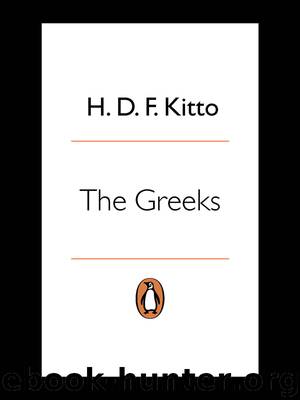The Greeks by H. D. F. Kitto

Author:H. D. F. Kitto
Language: eng
Format: epub
Publisher: Penguin Books Ltd
Published: 2013-03-04T05:00:00+00:00
VIII
The Greeks at War
The Greek world was now divided. On the one side was the Athenian Empire, which men openly called a ‘tyranny’; on the other, Sparta, the Peloponnesian League, and a number of states (notably in Boeotia) that sympathized with Sparta: the first group strong at sea, the second strong on land; the first in the main Ionian, the second Dorian – not that this division in itself counted for much; Athens favouring, even insisting on, democratic constitutions among her allies, the other group favouring oligarchies, or, at the most, limited democracies. It is a familiar situation. There was a general sentiment that Athens was behaving intolerably in restricting the autonomy of her nominal allies: this enabled Sparta to come forward as the champion of Greek freedom. There was also trade rivalry between Athens and Corinth, and the fear in Corinth that her commerce with the Western Greeks was being threatened. In the event, it was the Corinthians who persuaded the Spartans to take up the Athenian challenge: we quoted above a character-sketch of the Athenian people given on this occasion by a Corinthian speaker at Sparta.
This war was the turning-point in the history of the Greek polis. It lasted almost continuously from 431 to 404 – twenty-seven years of it. But for brief intermissions, fighting went on in almost every part of the Greek world – all over the Aegean, in and about Chalcidice, in Boeotia, around the coasts of the Peloponnese, in north-west Greece, in Sicily, where two powerful expeditionary forces of the Athenians were destroyed with scarcely a survivor: and Attica, all but the city and the Piraeus, which were enclosed by a single line of fortifications, was left open to the Spartan armies and systematically devastated. In the second year of the war, when the country-dwellers of Attica had been forced to abandon their homes to the enemy and to take refuge within the walls, living where they could, plague broke out and raged for months. Thucydides (who caught it but recovered) gives, in his apparently calm manner, an account of it that still makes the blood run cold: he makes a particular point of the moral breakdown which it caused, for in this agony obedience to law, religion, honesty and decency vanished. Something like a quarter of the polis died, including Pericles: yet Athens recovered, swept the seas, imported her corn regularly, sent out navies and armies, and on two or three occasions could have made peace on favourable terms; until, twenty-five years after the plague, she lost her last fleet in a humiliating way, and had to submit to the mercy of Sparta.
Yet all this time the life of the polis went on. Nothing of importance was decided except by the people in Assembly: generals were elected, second, third and fourth fronts opened, peace terms discussed, reports from the front considered, by this Assembly of all citizens. Only once during the war did its nerve fail, after the Sicilian catastrophe: then the Assembly
Download
This site does not store any files on its server. We only index and link to content provided by other sites. Please contact the content providers to delete copyright contents if any and email us, we'll remove relevant links or contents immediately.
Cecilia; Or, Memoirs of an Heiress — Volume 3 by Fanny Burney(30934)
Cecilia; Or, Memoirs of an Heiress — Volume 2 by Fanny Burney(30889)
Dialogue by Robert McKee(3582)
The 101 Dalmatians by Dodie Smith(2936)
Bound by Hatred (The Singham Bloodlines Book 2) by MV Kasi(2693)
Harry Potter and the Cursed Child - Parts One and Two by John Tiffany(2533)
The Beautiful Boys: A High School NA Reverse Harem Paranormal Bully Romance (Shadowlight Academy Book 1) by Gow Kailin(2498)
The Art of Dramatic Writing: Its Basis in the Creative Interpretation of Human Motives by Egri Lajos(2412)
Carrie's War by Nina Bawden(2102)
Angels in America by Tony Kushner(2048)
Unlaced by Jaci Burton & Jasmine Haynes & Joey W. Hill & Denise Rossetti(2022)
A Clockwork Orange by Anthony Burgess(1937)
The Femme Playlist & I Cannot Lie to the Stars That Made Me by Catherine Hernandez(1889)
Drama by John Lithgow(1883)
Open Book by Jessica Simpson(1795)
Outside Woman (BWWM Amish Romance) by Stacy-Deanne(1738)
Terrorist Cop by Mordecai Dzikansky & ROBERT SLATER(1718)
Yerma by Federico García Lorca(1637)
Leo's Desire by Sundari Venkatraman(1593)
